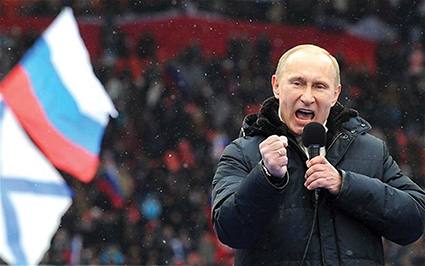Emergence of the Neo-Eurasianism Concept
OPED
Since the collapse of the Soviet Union, Russia has needed an ideological concept that could redefine its unique geostrategic position in the post-Cold War world. At the end of 1990s, the neo-Eurasianism ideological concept gained popularity among former Soviet state officials and intellectual elites, with the special role it ascribed to Russian civilization in contrast to the “hostile West.” With the rise of Vladimir Putin to power in 2000, a unique chance to implement these neo-Eurasian ideas in practice emerged. As a result, such a situation led to a variety of activities aimed at rebuilding Russia within the USSR borders and to unify the Eurasian space in political, economic and security terms.
In 2000s, the neo-Eurasianism concept has been the key driving force behind the foreign policy of Russia in relation to the former Soviet Union (FSU) states. The Kremlin’s actions within the last several years, coupled with statements made by its proponents, indicate that the key imperative of this concept is to establish the Russia’s dominance in the post-Soviet space and prevent any potential western ambitions to encircle and diminish Russia’s role in that space.
Putin’s doctrine, which is based on neo-Eurasianism ideas, have provided a justification for any efforts to restore the unity of the “Russian nation” through Eurasian integration or creation of a single state spanning at least a part of the post-Soviet area. Thus, any FSU state unwilling to pursue a neo-Eurasianism agenda will be conditioned to political, economic and military pressure.
Georgia and Ukraine as victims of neo-Eurasianism aspirations of Russia
One bright example of non-compliance with the Kremlin’s neo-Eurasianism agenda was Georgia. It was aspiring to pursue NATO and EU membership in order to get out of the sphere of influence of the Russian Federation. What followed was an armed conflict between Georgia and Russia which took place on the Georgian territory of two breakaway regions, Abkhazia and South Ossetia. Consequently, in spite of the withdrawal of Russian troops from these regions, buffer zones around Abkhazia and South Ossetia were established. The key goal of the Kremlin’s neo-Eurasianism agenda was to prevent any potential EU and NATO enlargement in the Caucasus. Hence, it decided to retaliate against Georgia, and force it to relinquish its aspirations to pursue potential NATO and EU membership. Such actions resulted in the signing of Russian-Ossetian treaty of alliance and integration in Moscow on 18th March 2015, similar to the one signed between Russia and Abkhazia in November 2014. These signed agreements implied the abolishment of border controls and introduction of a simplified procedure on obtaining Russian citizenship.
The most striking ongoing case is Ukraine, which is located between Russia and Europe. For a long time, Ukraine had been trying to pursue a balanced geopolitical strategy. However, the time came to decide which geopolitical path to choose, and Ukrainian leadership opted to follow a closer convergence with the West through pursuing an Association Agreement with the EU. Nevertheless, under the Russian pressure driven by neo-Eurasianism ambitions, and unwilling to let Ukraine drift away from its potential accession to the Russian-led Custom Union, former Ukrainian President Yanukovych was forced to suspend the signing procedure of the Association Agreement with the EU that was planned for the end of November, 2014. Subsequently, it led to the Revolution of Dignity, toppling of Yanukovych and arrival of the pro-Western government in Ukraine. The ousting of Yanukovych served as a pretext of Russian interference in Ukraine, which resulted in full-scale informational, political and subsequently military measures applied to destabilize Ukraine for diverting from the neo-Eurasianism agenda.
After Crimea was annexed by Russia, the Kremlin resumed its activities to respond to Ukraine for not complying with the Kremlin’s neo-Eurasianism project by destabilizing the situation in eastern Ukraine. Not surprising, neo-Eurasianism ideologists, headed by Dugin, together with a number of leading Russian political figures, forwarded a proposal to introduce a Little Russia State (Malorussia) formed from the southern-eastern and central parts of Ukraine, including the capital Kyiv. In the opinion of Russian elites, “Little Russia” would then decide its own fate regarding uniting with Russia and the “Russian World.” Incidentally, in 2014, the term “Little Russia” appeared in Russian President Putin’s speech about the historical background of this territory being governed by the Tsarist governorate under Catherine the Great in the late 18th century.
The Kremlin has pursued policies inspired by neo-Eurasian ideologists to justify its intensification of geopolitical pressure in the post-Soviet space, aimed at subordinating and controlling FSU states. It is highly likely that other countries in the region that oppose the implementation of the neo-Eurasianism project might follow the path of Georgia and Ukraine.
Maksym Beznosiuk is an international relations specialist from Kyiv, Ukraine.
Maksym Beznosiuk












